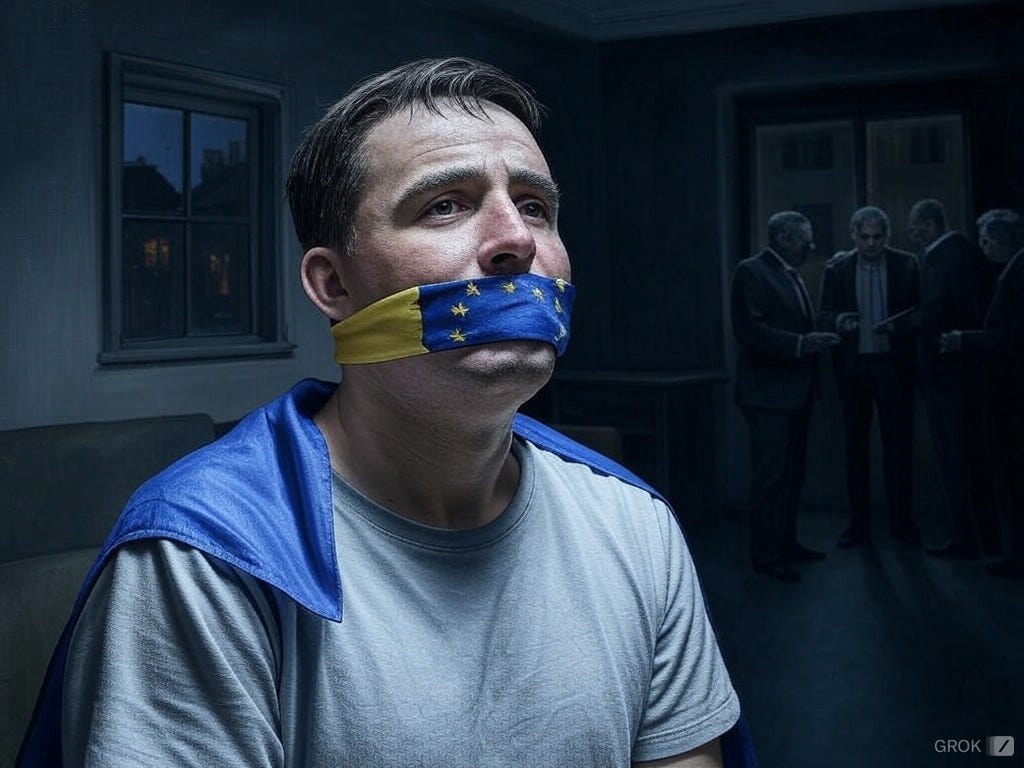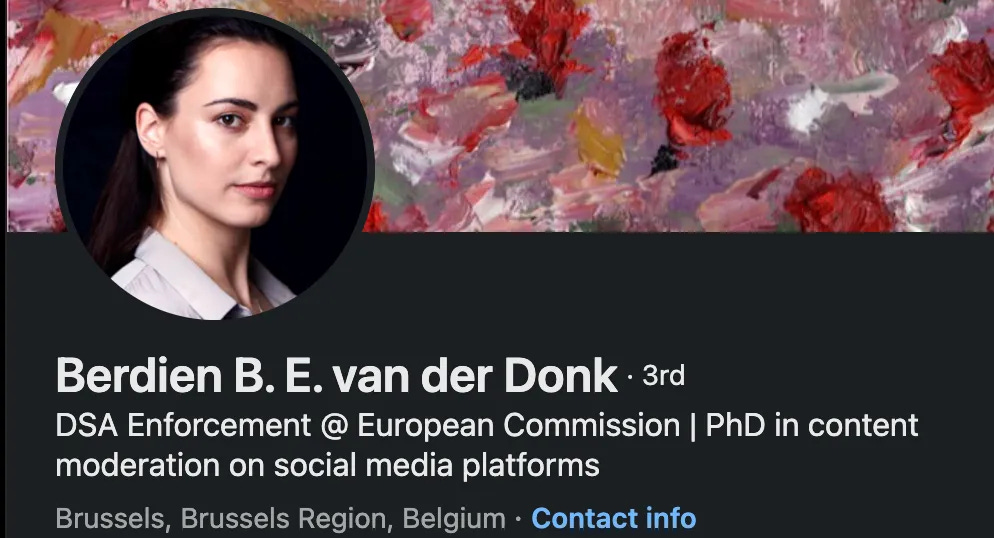Ursula has been warning for some time that social media platforms need to behave, they need to censor content, provide all the information required and requested by European entities, and this includes all user data, posts, and private messages.
The EU has learned from Brazil and wants to hit where it hurts the most, which is in the companies' revenue. If 6% of the global annual return is not enough, a daily charge of 5% of the global return of the social network is foreseen.
The DSA Police
Several bodies and partnerships have been created to expand the supervision of content and the enforcement of the DSA. There are even several profiles on LinkedIn with the description "Case Handler Officer - Digital Services Act European Commission". Shortly after creating a post on LinkedIn, I was visited by one of these agents.
https://www.linkedin.com/in/berdienvddonk/
Supervision under the Digital Services Act (DSA) is shared at several levels:
National Digital Services Coordinators Each EU Member State designates a Digital Services Coordinator (DSC) to oversee compliance at the national level. They are the primary authority for platforms operating within their jurisdiction, handling complaints, investigations, and sanctions.
European Commission For very large online platforms (VLOPs) and very large online search engines (VLOSEs) — those with over 45 million users in the EU — the European Commission directly supervises compliance. This includes transparency requirements, systemic risk assessments, and algorithm audits.
Cooperation Among Member States National DSCs work together and share information to address cross-border issues. If illegal content spreads across countries, various authorities collaborate to enforce the rules effectively.
Independent Auditors Platforms must undergo independent audits to verify compliance with DSA obligations like content moderation, transparency reports, and risk mitigation.
Civil Society and Researchers The DSA encourages trusted flaggers — independent organizations — to identify harmful or illegal content. Researchers will have access to platform data for studies on risks to public discourse.
In practice, the European Commission oversees top-level supervision for large platforms, while national coordinators manage local implementation. However, there are concerns that this multi-level system might be influenced by national political interests or lead to inconsistencies in rule application.
An entire economy has been built around social media, with hundreds of bodies, collaborators, and partners, spending millions of euros every year for something the EU doesn't need and which goes against democratic principles.
All these "independent" auditors chosen and approved by the commission, aligning with its vision, will impose their order on content, much worse than Twitter's moderation department. We'll have climate activist lobbies, pharmaceutical-linked groups, woke agendas, and many others influencing public discourse depending on the region and who is overseeing it.
A propaganda machine has been legitimized by regulation with pornographic fines capable of silencing the boldest.
Moderation Reports Directly to European Authorities
Platforms must annually report on their content moderation decisions. This allows the EU and all bodies controlling content to ensure platforms behave as expected by the EU, that inconvenient narratives have been duly silenced, and the moderation system is working as anticipated.
Of course, like in any good lie, there's always a bit of truth; user rights are also foreseen in this regulation — It provides for greater transparency in the reasons behind content censorship, but is it really an added value? The preemptive removal of content until clarification and potential unblocking ends up undermining the impact of certain posts.
Everything Open - All Content Potentially Censorable
Very Large Online Platforms (VLOPs) (those with more than 45 million monthly active users in the EU) must conduct risk assessments related to disinformation, hate speech, and other systemic risks.
Any intrusion by governmental entities into public discourse is censorship; they might find various names, shield themselves with the protection of a greater good, but this has always been the basis of totalitarian regimes: we censor and control discourse to protect you.
The EU, Ursula, and Thierry Breton have been very vocal about accusing disinformation, something very subjective and which traditional media does daily without consequence. For Thierry Breton, even Trump's interview with Musk during the election should not have been allowed; there's a document from him requesting the broadcast be blocked. For European leadership, anything that contradicts the official narrative is disinformation, potentially leading us to a world of absolute, singular truth, completely undemocratic.
Detailed Advertising Regulation
All advertising must provide detailed information on who promotes it and for whom it serves, another regulation that mandates KYC and invades the privacy of those involved, providing this to third parties.
The requirement for excessive information that adds no value ends up making platforms less interesting, just like what happened with GDPR; no one wants to be forced to select through 50 windows to access content. Users should not be treated as ignorant; we need to invest in education and critical thinking rather than regulating down to the smallest detail in an overprotective manner that has the opposite effect.
There's already control over advertising by platforms; the increased bureaucracy will, as usual in Europe, end up affecting platform revenue, necessitating more procedures, permissions, and delays.
Government Powers and Potential Censorship
With the DSA, the EU threatens fines up to 6% of a company's global revenue, infringing on the principle of proportionality and trying to deter, under coercion, platforms that will end up censoring any content that might be slightly considered harmful. We're talking about regulation so broad that it will cause unprecedented interference in freedom of expression. The threat of fines does not stop at revenue within the EU; it considers revenue outside the continent's jurisdiction.
This initiative will have an unprecedented impact on public discourse, shaping conversation according to content censorship.
Content Removal - Emergency Procedures
In cases of imminent threats to public safety or health, faster removal procedures can be activated, potentially leading to the rapid removal of content.
Besides the vast spectrum of what can or cannot be considered censorable content, there's the emergency procedure allowing immediate content removal without due process or courts; this is the theoretical basis for censorship. It's easy to imagine during the pandemic what this control tool would have allowed; platforms would immediately remove any hint of content mentioning vaccines, anything questioning the origin of the virus, or the efficacy of vaccines under this emergency procedure. Given the unprecedented level of information suppression that already existed, one can only expect much worse in the future with this regulation in place.
Algorithmic Transparency
But the DSA doesn't stop there; algorithms that influence content visibility are subject to scrutiny, which could affect how platforms manage discourse but also aims to prevent biases that might suppress certain viewpoints.
The EU wants to have a say in the algorithm, which means it can suppress certain information under any pretext, clearly manipulating how European citizens consume content; social media will end up serving as EU propaganda channels.
Impact on Smaller Platforms
Compliance with the DSA's strict rules will disproportionately affect smaller platforms, leading them to self-censor to avoid legal risks. This will limit the diversity of forums and the representation of alternative perspectives.
Through this and other regulations, the EU ends up having a very negative impact on the European continent's economy. It's not by chance that Europe is currently the least competitive space, lacking innovation and in economic decline over the last three decades. With these obstacles, how can small platforms have the capacity to respond to this bureaucratic avalanche? How can a small social platform start its business with these requirements? With police designated throughout Europe to scrape content and submit censorship requests, reports, and potential fines.
Future and Totalitarian Control
In 2025, alongside the DSA, MiCA will regulate and limit cryptocurrencies, we'll have the digital passport, the vaccination passport, the Digital ID, and soon the digital Euro. The implementation of all these regulations embodies the greatest attack on freedom and democracy of this century, perhaps ever, because it's not about a war, a country where fascism has taken hold; it's an entire continent about to come under the absolute control of a federation with unelected leadership that manages the continent's resources with total subservience from spineless politicians without the courage to take a stand. With a few exceptions like in Eastern Europe, because they know well what totalitarian control smells and tastes like.
We need leaders willing to challenge the current construction of the EU, waving the threat of a "Brexit" if there's insistence on this path.
Share while you still can.





